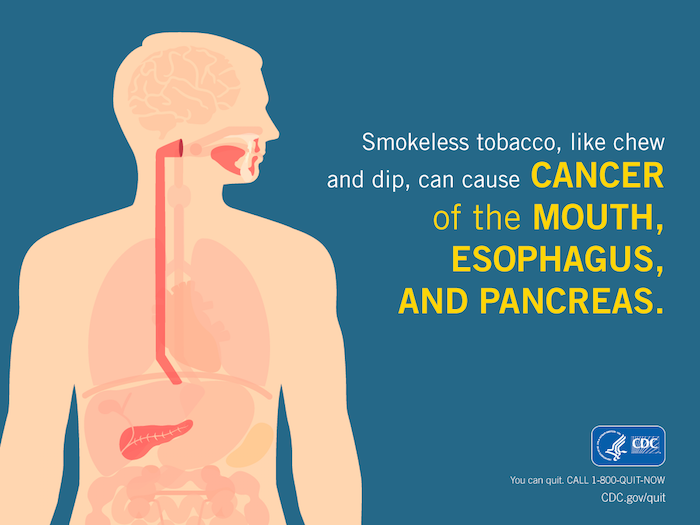Quitting Smokeless Tobacco: A Success Story
Last year, Duke’s employee wellness program helped 170 colleagues, including Craig Hughes

Craig Hughes grew up with friends who chewed tobacco and smoked cigarettes during afternoons at the beach in Crystal River, Fla.
So when a friend offered then 13-year-old Hughes chewing tobacco, a smokeless tobacco product, he eagerly accepted a piece.
 “I did it to fit in,” said Hughes, a maintenance technician with Duke Forest. “Everyone smoked or chewed tobacco. Nobody thought anything of a teenager doing it.
“I did it to fit in,” said Hughes, a maintenance technician with Duke Forest. “Everyone smoked or chewed tobacco. Nobody thought anything of a teenager doing it.
Using tobacco grew into a habit for Hughes, now 50. He chewed tobacco or used snuff, smokeless tobacco placed between your lower lip and gum, after every meal and before bed, going through a can of Longhorn tobacco a day. After 36 years of using tobacco, Hughes quit last year with help from Duke’s tobacco cessation resources in preparation for the university’s tobacco-free policy that went into effect on July 1, 2020.
Duke University prohibits the use of all tobacco-based products, including but not limited, to cigarettes, cigars, cigarillos, hookahs, chewing tobacco, snuff and electronic smoking devices. The policy, already in place for Duke Health, now applies to all facilities owned or leased by Duke.
“Using nicotine was my stress relief,” Hughes said.
Benefits-eligible Duke employees and their dependents have access to copay-free visits with a provider and low-cost tobacco cessation medications using Duke’s medical plan benefits through the Tobacco Cessation Treatment Program with LIVE FOR LIFE, Duke’s employee wellness program. Other treatment pathways are available through a collaboration with the Quit at Duke program, a comprehensive physician-led service that provides tobacco dependence treatment through the Duke Cancer Institute. Last year, LIVE FOR LIFE treated 170 employees.
 “Everybody’s relationship with tobacco use is different,” said Sakinah Omar, LIVE FOR LIFE’s tobacco treatment specialist. “A plan working for one patient won’t necessarily work for another. I’m here to understand why and when they use tobacco so we can identify ways to eliminate their habit. It’s all about support and empathy.”
“Everybody’s relationship with tobacco use is different,” said Sakinah Omar, LIVE FOR LIFE’s tobacco treatment specialist. “A plan working for one patient won’t necessarily work for another. I’m here to understand why and when they use tobacco so we can identify ways to eliminate their habit. It’s all about support and empathy.”
Tobacco use causes an estimated 7 million deaths a year worldwide, according to the Centers for Disease Control and Prevention (CDC). The CDC reports that smokeless tobacco can cause cancer of the mouth, esophagus and pancreas.
“Even treating one patient is worth celebrating because their decision to quit improves their health and could possibly save their life,” Omar said.
Hughes was considering quitting tobacco last January in advance of the policy taking effect when a nurse with Duke Employee Occupational Health & Wellness (EOHW) mentioned the tobacco cessation program. Later that month, Hughes met with the LIVE FOR LIFE tobacco cessation team. The team includes a tobacco treatment specialist and nurse practitioner who help patients create a plan to quit.
The EOHW nurse practitioner prescribed Hughes tobacco cessation medication and nicotine gum. The medication and gum each cost $10 a month under the LIVE FOR LIFE program. The meetings with the tobacco cessation treatment team came at no charge.
 Omar worked with Hughes on identifying habits he associated with smokeless tobacco, such as a morning bottle of Diet Mountain Dew and the drive home to Durham from work.
Omar worked with Hughes on identifying habits he associated with smokeless tobacco, such as a morning bottle of Diet Mountain Dew and the drive home to Durham from work.
“The habit was as bad as the addiction for me,” Hughes said. “I’m someone who likes my routine, and chewing tobacco was part of that. It was automatic for me to use some in the morning or to end the day. My brain was on autopilot.”
Hughes tried to stop using tobacco once when he was in his mid-20s, but he lasted a week. Many of Hughes’ friends still consumed various types of tobacco and the temptation to use chewing tobacco and snuff remained strong.
Now, Hughes said, weekly phone calls with Omar from LIVE FOR LIFE kept him from returning to tobacco during his second attempt to quit.
“It became exciting waiting for her phone call to tell her I hadn’t been chewing,” Hughes said. “She genuinely cares. It makes you want to stay off the stuff.”
Hughes hasn’t used any tobacco product since his first meeting with Omar in January of 2020, and he credits the pandemic for disrupting a daily routine that included the tobacco habit. Hughes didn’t drive as much, so the desire to use tobacco was less frequent.
Instead of having tobacco, he chews on plain sunflower seeds or mint leaves and feels less stressed overall since quitting tobacco.
“I’m not living with this guilt of having a habit that wrecks my health,” Hughes said. “I’m so proud to kick the habit.”
Find Duke support resources to quit here.
Have you quit tobacco or smoking? Share your story here.